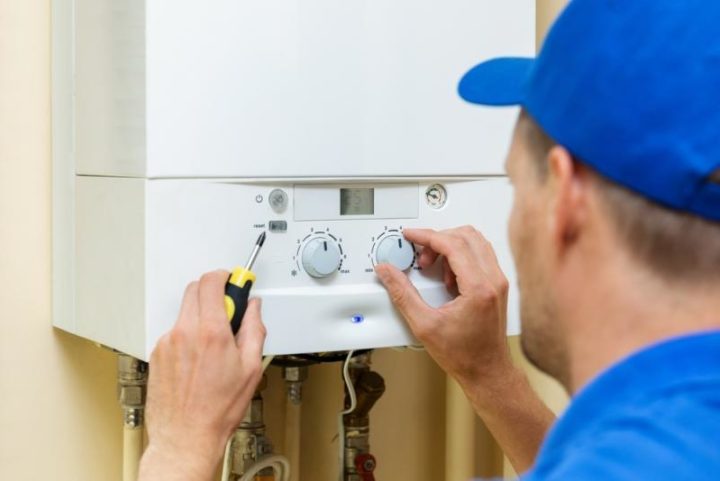Boiler bust-ups: are fears of ditching gas overblown?
Gas boilers have become an unlikely battleground, but are they as great as media coverage suggests?
By Jonny Marshall
Share
Last updated:
Gas boilers have become an unlikely battle ground in the UK’s quest to reach net zero emissions by mid-century.
While the surge of interest in one of a home’s more boring appliances may surprise some, it also highlights some of the more challenging issues around both selling the changes that a zero carbon life will entail, and ensuring that the wants and needs of British families are considered by politicians and policy-makers.
Carbon dioxide from heating our homes remain a small, yet significant, proportion of national emissions. Unlike most other sources though, it is not falling, having increased slightly since 2014.
Caused by a combination of stagnant policy to improve the building stock, and the continued construction of new homes that could be much greener, it is widely understood that cutting carbon from domestic properties will be a tricky component of reaching net zero.
And while a silver bullet solution remains elusive, the notion that families will be forced to rip out their beloved boilers seems somewhat unusual.
Breakdown

The supposed national love affair with gas boilers also overlooks a common dilemma that most of us will have faced, the hassle of one breaking down.
In 2016, for example, it was found that nearly a fifth of households had to deal with cold baths and chilly rooms.
The average repair cost for each of these c.4.5 million families was £270, a combined bill getting on for nearly £800 million. For a quarter of a million of these households, this unplanned outlay topped £1,250, or more than 2.5 weeks of the average national salary.
Just last year, British Gas warned that more than 125,000 boilers would break down in the run up to Christmas. It’s suggested solution to this, of course, is that its customers take out boiler breakdown cover.
With British Gas schemes priced at £234-444 per year for a policy with no excess, this would add a chunky 41-78% to the average household gas bill, an extra expense that would not go unnoticed by families up and down the country.
Hardly the hassle-free lifestyle suggested by the outcry associated with moving away from what remains a century-old technology.
Opinion
With breakdowns-a-plenty, it is not surprising that backing for a move away from gas boilers shows up up in polling data.
Recently released numbers from Public First showed that, when asked if they would consider a heat pump instead of a gas boiler as good or bad in a new home, 44% of Brits would see the low carbon alternative as positive or very positive, with just 9% in opposition.

And when presented with a number of potential policies to aid the shift, ‘encouraging people to change their boilers to become more environmentally friendly’ was the third most popular option, backed by 35% of survey respondents.
Marginally ahead were requiring all new homes to be fitted with solar panels (39%) and offering loans to make homes more efficient which are then repaid from lower energy bills, as touted in the 2019 Labour manifesto, which had the backing of 40% of polled Brits.
However, mirroring recent figures from Citizens Advice and Policy Connect, public awareness of how to keep warm at home without warming the planet remained low; just 8% of respondents either have, or know someone with, a heat pump in place of a gas boiler.
Costs
If there is any aspect of ‘ripping out gas boilers’ that will be keeping policymakers up at night, it will be the effect on energy bills. Despite a decade-long downward trend in costs to households, energy bills remain an established political weapon.
And with a kilowatt hour of electricity higher priced that gas, this worry could be justified.
However, there are no shortage of ways to ensure that the move to carbon-free heat doesn't hit homeowners in the pocket. A recent report from the centre-right Onward think tank showed that, by rebalancing policy costs across fuels, the move from boiler to heat pump could take place without an overall increase in energy bills.
Ending the ‘effective subsidy’ of gas through a lower rate of VAT than other fuels, as noted by the Oxford Institute of Energy Studies, could also help cut the difference between fuel costs.
The Treasury’s Net Zero review, out November, is also expected to outline means of funding the transition to low carbon heat without hurting household budgets. A recent leak to the BBC suggested that some energy costs could be removed from bills and paid for through general taxation instead, easing pressure on low income homes.
Of course, ramping up the energy performance of British homes will see energy use and bills plummet. Upgrading homes so that they meet EPC band C can knock £270 from annual bills, as well as improving living conditions.
This isn’t to say that the switch away from gas will be easy. There are a number of crucial moments this year, culminating in a low-carbon heat framework expected within the next six months or so.
Having kicked off with mixed messages – good progress on innovation funding but an underwhelming standard for new homes – it is essential that 2020 is the year that the Government produces a vision of how we are going to warm our homes in the coming decades.
Share